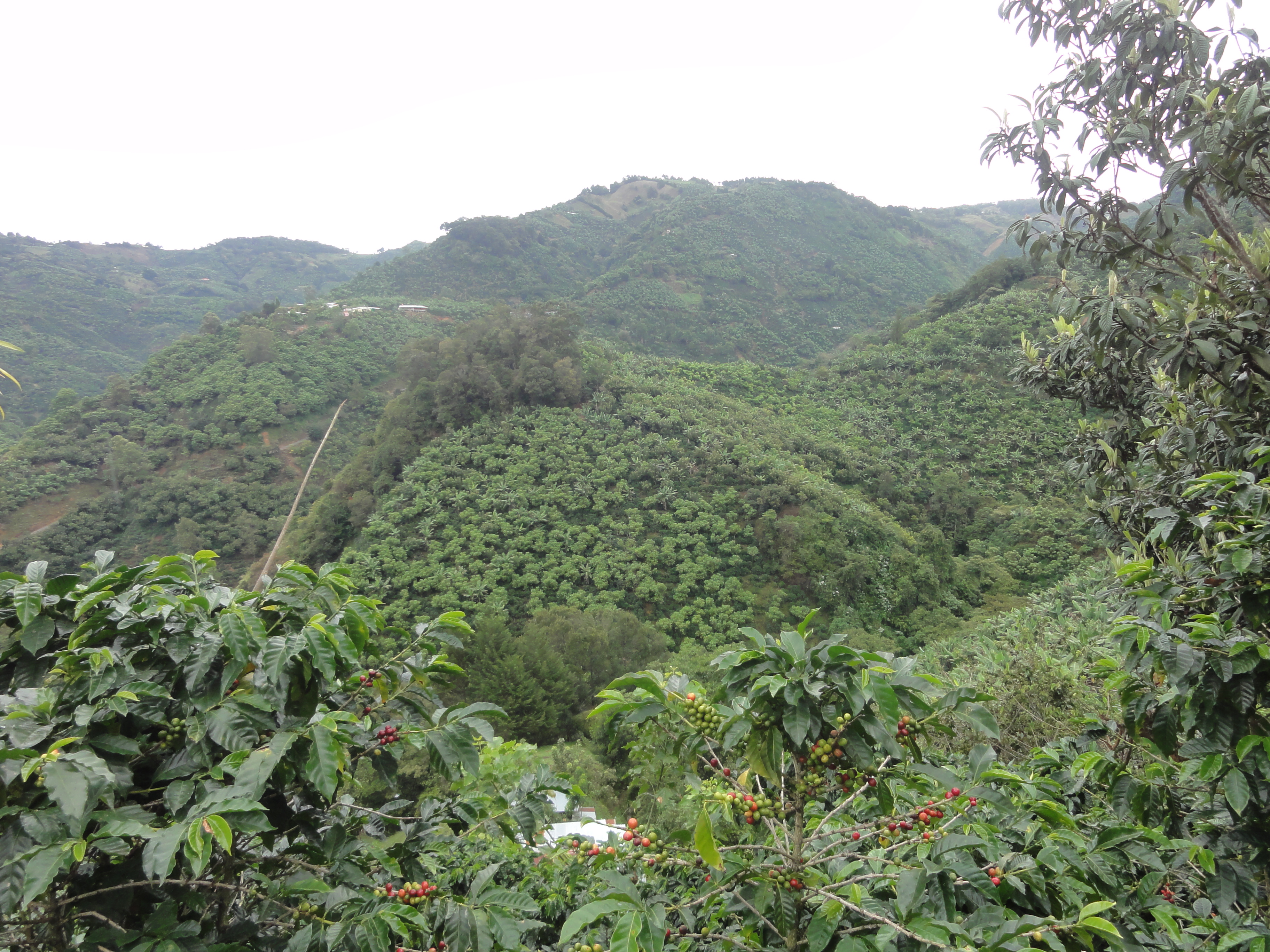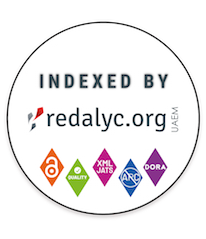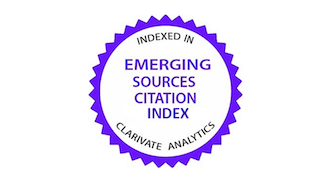Climate change perceptions and adaptive responses of small-scale coffee farmers in Costa Rica
DOI:
https://doi.org/10.15517/am.v30i2.32905Keywords:
climate change adaptation, ecosystem-based adaptation, crop losses, environmental policiesAbstract
Introduction. Climate change will affect the distribution, productivity and profitability of coffee production in Central America, negatively impacting national economies and small farmer livelihoods. There is a need to understand how climate change affects small coffee farmers in the region in order to promote measures that allow them to cope with and adapt to these changes. Objective. The objective of this study was to describe Costa Rican small-scale coffee systems in two vulnerable agricultural landscapesand explorethe adaptation efforts that coffee farmers have implemented in these two coffee systems. Materials and methods. Structured surveys were conducted with coffee-producing households in two highly vulnerable landscapes, Turrialba and Los Santos, in Costa Rica, from March-May 2014. The study was based on farmers’ perceptions of changes in temperature and rain, reported impacts of these changes and the adaptation actions implemented at farm level. Results. Ninety-eight percentof farmers perceived changes in local climate and most of them related these changes with impacts on production (increase in pests and diseases, floweringproblems and other reported impacts). Sixty percentof the surveyed farmers had modified the management of their farms in order to reduce climate change impacts. The most common adaptation measures used by farmers were the planting of trees and the increased use of agrochemical inputs, mostly in response to perceptions of increasing temperatures. Conclusion. This study highlights the need for greater technical, financial and policy support to help smallholder coffee farmers implement adaptation practices and become more resilient to climate change.
Downloads
References
Aguilar, E., T.C. Peterson, P. Ramírez, R. Frutos, J.A. Retana, M. Solera, J. Soley, I. González-García, R.M. Araujo, A. Rosa-Santos, V.E. Valle, M. Brunet, L. Aguilar, L. Álvarez, M. Bautista, C. Castañón, L. Herrera, E. Ruano, J.J. Sinay, E.
Sánchez, G.I. Hernández-Oviedo, F. Obed, J.E. Salgado, J.L. Vásquez, M. Baca, M. Gutiérrez, C. Centella, J. Espinosa,
D. Martínez, B. Olmedo, C.E. Ojeda-Espinoza, R. Núñez, M. Haylock, H. Benavides, and R. Mayorga. 2005. Changes
in precipitation and temperature extremes in Central America and northern South America, 1961-2003. J. Geophys. Res. 110:D23107. doi:10.1029/2005JD006119
Alpizar, F., C.A. Harvey, M. Saborío-Rodríguez, B. Viguera, M.R. Martínez-Rodríguez, and R. Vignola. 2019. Household
survey of climate change perception and adaptation strategies of smallholder coffee and basic grain farmers in Central America 2004-2014. UK Data Service, Colchester, Essex, GBR. http://reshare.ukdataservice.ac.uk/853252/ (consultado 30 mar. 2019).
Alpízar, M., M. Chacón, K. López, C. Medaglia, E. Mora, L. Moreira, y S. Segura. 2015. Estadísticas de comercio exterior de Costa Rica 2014. PROCOMER, San José, CRC. http://www.procomer.com/uploads/downloads/anuario-estadistico-2014.pdf (consultado 9 ago. 2017).
Altieri, M.A., and P. Koohafkan. 2008. Enduring farms: climate change, smallholders and traditional farming communities. Third World Network, Penang, MAS.
Altieri, M.A., C.I. Nicholls, A. Henao, and M.A. Lana. 2015. Agroecology and the design of climate change-resilient farming systems. Agron. Sust. Dev. 35:869-890. doi:10.1007/s13593-015-0285-2
Bacon, C.M., W.A. Sundstrom, I.T. Stewart, and D. Beezer. 2017. Vulnerability to cumulative hazards: coping with the coffee leaf rust outbreak, drought, and food insecurity in Nicaragua. World Dev. 93:136-152. doi:10.1016/j.worlddev.2016.12.025
Bunn, C., P. Läderach, O. Ovalle-Rivera, and D. Kirschke. 2015. A bitter cup: climate change profile of global production of Arabica and Robusta coffee. Climatic Change 129:89-101. doi:10.1007/s10584-014-1306-x
Buppert, T., and A. McKeehan. 2013. Guidelines for applying free, prior and informed consent: a manual for conservation international. Conservation International, Arlington, VA, USA.
Burke, M., and D. Lobell. 2010. Food security and adaptation to climate change: What do we know? In: D. Lovell, and M. Burke, editors, Climate change and food security. Springer, Berlin, GER. p. 133-153.
Burnham, M., and Z. Ma. 2015. Linking smallholder farmer climate change adaptation decisions to development. Climate Develop. 8:289-311 doi:10.1080/17565529.2015.1067180
CBD (Secretariat of the Convention on Biological Diversity). 2009. Connecting biodiversity and climate change mitigation and adaptation: Key messages from the report of the second Ad Hoc technical expert group on biodiversity and climate change. CBD, Montreal, CAN. https://www.cbd.int/doc/publications/ahteg-brochure-en.pdf (accessed Aug. 9, 2017).
CEPAL (Comisión Económica para América Latina y el Caribe), y CAC/SICA (Consejo Agropecuario Centroamericano/ Sistema de la Integración Centroamericano). 2014. Impactos potenciales del cambio climático sobre el café en Centroamérica. CEPAL, MEX.
Conway, G. 2011. On being a smallholder. Presented at: Conference on New Directions for Smallholder Agriculture. IFAD, Rome, ITA, 24-25 Jan.
Cruz-Bello, G.M., H. Eakin, H. Morales, and J.F. Barrera. 2011. Linking multi-temporal analysis and community consultation to evaluate the response to the impact of hurricane stan in coffee areas of Chiapas, Mexico. Nat. Hazards 58:103-116. doi:10.1007/s11069-010-9652-0
Dasgupta, P., J.F. Morton, D. Dodman, B. Karapinar, F. Meza, M.G. Rivera-Ferre, A. Toure Sarr, and K.E. Vincent, 2014: Rural areas. In: C.B. Field et al., editors, Climate change 2014: impacts, adaptation, and vulnerability. Part A: global and sectoral aspects. Contribution of Working Group II to the Fifth Assessment Report of the Intergovernmental Panel on Climate Change. Cambridge University Press, Cambridge, GBR, and NY, USA. p. 613-657.
Donat, M.G., L.V. Alexander, H. Yang, I. Durre, R. Vose, R.J.H. Dunn, K.M. Willett, E. Aguilar, M. Brunet, J. Caesar, B. Hewitson, C. Jack, A.M.G. Klein Tank, A.C. Kruger, J.A. Marengo, T.C. Peterson, M. Renom, C. Oria Rojas, M. Rusticucci, J. Salinger, A. Sanhouri Elrayah, S.S. Sekele, A.K. Srivastava, B. Trewin, C. Villarroel, L.A. Vincent, P. Zhai, X. Zhang, and S. Kitching. 2013. Updated analyses of temperature and precipitation extreme indices since the beginning of the twentieth century: the HadEX2 dataset. J. Geophys. Res. Atmosph.118:2098-2118. doi:10.1002/jgrd.50150
Donatti, C.I., C.A. Harvey, M.R. Martinez-Rodriguez, R. Vignola, and C.M. Rodríguez. 2018. Vulnerability of smallholder farmers to climate change in Central America and Mexico: current knowledge and research gaps. Climate Dev. 5529:1-23. doi:10.1080/17565529.2018.1442796
Eakin, H., L.A. Bojórquez-Tapia, R. Monterde-Diaz, E. Castellanos, and J. Haggar. 2011. Adaptive capacity and socialenvironmental change: theoretical and operational modeling of smallholder coffee systems response in mesoamerican pacific rim. Environ. Manag. 47:352-367. doi:10.1007/s00267-010-9603-2
Eakin, H., C.M. Tucker, E. Castellanos, R. Diaz-Porras, J.F. Barrera, and H. Morales. 2014. Adaptation in a multi-stressor environment: perceptions and responses to climatic and economic risks by coffee growers in Mesoamerica. Environ. Dev. Sustain. 16:123-139. doi:10.1007/s10668-013-9466-9
Fischersworring, B., G. Schmidt, K. Linne, P. Pringle, and P.S. Baker. 2015. Climate change adaptation in coffee production: A step-by-step guide to supporting coffee farmers in adapting to climate change. CABI. https://www.cabi.org/Uploads/CABI/projects/Coffee%20and%20climate%20change.pdf (accessed Sep.19, 2017)
Frank, E., H. Eakin, and D. López-Carr. 2011. Social identity, perception and motivation in adaptation to climate risk in the coffee sector of Chiapas, Mexico. Global Environ. Change 21:66-76. doi:10.1016/j.gloenvcha.2010.11.001
Gay, C., F. Estrada, C. Conde, H. Eakin, and L. Villers. 2006. Potential impacts of climate change on agriculture: A case of study of coffee production in Veracruz, Mexico. Climatic Change 79:259-288. doi:10.1007/s10584-006-9066-x
Hannah, L., C.I. Donatti, C.A. Harvey, E. Alfaro, D.A. Rodriguez, C. Bouroncle, E. Castellanos, F. Diaz, E. Fung, H.G.
Hidalgo, P. Imbach, P. Läderach, J.P. Landrum, and A.L. Solano. 2017. Regional modeling of climate change impacts on smallholder agriculture and ecosystems in Central America. Climatic Change 141:29-45. doi:10.1007/s10584-016-1867
Harvey, C.A., M. Chacón, C.I. Donatti, E. Garen, L. Hannah, A. Andrade, L. Bede, D. Brown, A. Calle, J. Chará, C. Clement, E. Gray, M.H. Hoang, P. Minang, A.M. Rodríguez, C. Seeberg-Elverfeldt, B. Semroc, S. Shames, S. Smukler, E. Somarriba, E. Torquebiau, J. van-Etten, and E. Wollenberg. 2014. Climate-smart landscapes: Opportunities and challenges for integrating adaptation and mitigation in tropical agriculture. Conserv. Lett. 7(2):77-90. doi:10.1111/conl.12066
Harvey, C.A., M.R. Martínez-Rodríguez, J.M. Cárdenas, J. Avelino, B. Rapidel, R. Vignola, C.I. Donatti, and S. Vilchez-
Mendoza. 2017. The use of ecosystem-based adaptation practices by smallholder farmers in Central America. Agric.
Ecosyst. Environ. 246: 279-290 doi:10.1016/j.agee.2017.04.018
Holdridge, L.R. 1947. Determination of world plant formations from simple climatic data. Science 105:367-368. doi:10.1126/science.105.2727.367
Holt-Giménz, E. 2002. Measuring farmers’ agroecological resistance after hurricane Mitch in Nicaragua: A case study in participatory, sustainable land management impact monitoring. Agric. Ecosyst. Environ. 93:87-105. doi:10.1016/S0167-8809(02)00006-3
ICAFE (Instituto del Café de Costa Rica). 2016. Informe sobre la actividad cafetalera de Costa Rica. ICAFE, Heredia, CRC. http://www.icafe.cr/wp-content/uploads/informacion_mercado/informes_actividad/anteriores/2016.pdf (consultado 3 ago. 2017).
ICAFE (Instituto del Café de Costa Rica). s.f. Regiones cafetaleras de Costa Rica: Tarrazú. ICAFE, Heredia, CRC. http://www.icafe.cr/nuestro-Cafe/regiones-Cafetaleras/tarrazu/ (consultado 8 mar. 2018).
Imbach, P., M. Beardsley, C. Bouroncle, C. Medellin, P. Läderach, H. Hidalgo, E. Alfaro, J. Van-Etten, R. Allan, D. Hemming, R. Stone, L. Hannah, and C.I. Donatti. 2017. Climate change, ecosystems and smallholder agriculture in Central America: an introduction to the special issue. Climatic Change 141:1-12. doi:10.1007/s10584-017-1920-5
INEC (Instituto Nacional de Estadística y Censos). 2007. Censo cafetalero: Turrialba y Coto Brus 2003, Valle Central y Valle Central Occidental 2004, y Pérez Zeledón, Tarrazú y Zona Norte 2006. Principales resultados. Instituto del Café de Costa Rica, San José, CRC. http://www.inec.go.cr/censos/censos-cafetalero (consultado 9 ago. 2017).
INDER (Instituto de Desarrollo Rural). 2016. Plan de desarrollo rural territorial (PDRT) 2016-2021 - Los Santos. INDER, CRC. https://www.inder.go.cr/territorios_inder/region_central/planes_desarollo/PDRT-Los-Santos.pdf (consultado 8 mar. 2018).
IPCC. 2012. Managing the risks of extreme events and disasters to advance climate change adaptation. Cambridge University Press, Cambridge, GBR, and NY, USA.
Läderach, P., J. Haggar, C. Lau, A. Eitzinger, O. Ovalle, M. Baca, A. Jarvis, and M. Lundy. 2013. Mesoamerican coffee: building a climate change adaptation strategy. CIAT Policy Brief No. 2. CIAT, Cali, COL.
Lin, B.B., I. Perfecto, and J. Vandermeer. 2008. Synergies between agricultural intensification and climate change could create surprising vulnerabilities for crops. BioSci. 58:847-854. doi:10.1641/B580911
Magrin, G.O., J.A. Marengo, J.P. Boulanger, M.S. Buckeridge, E. Castellanos, G. Poveda, F.R. Scarano, and S. Vicuña. 2014. Central and South America. In: V.R Barros et al., editors, Climate change 2014: Impacts, adaptation, and vulnerability. Part B: Regional aspects. Contribution of working group II to the fifth assessment report of the Intergovernmental Panel on Climate Change. Cambrige University Press, GBR and NY, USA. p. 1499-1556.
MIDEPLAN (Ministerio de Planificación Nacional y Política Económica), y SICA (Sistema de Integración Centroamericana). 2016. Plan cantonal de desarrollo humano local (PCDHL) 2016-2026: Cantón de Turrialba. Docplayer, ESP. https://docplayer.es/53037001-Plan-cantonal-de-desarrollo-humano-local-pcdhl.html (consultado 8 mar. 2018).
Moguel, P., and V.M. Toledo. 1999. Biodiversity conservation in traditional coffee systems of Mexico. Conserv. Biol. 13(1):11-21. doi:10.1046/j.1523-1739.1999.97153.x
Nagayets, O. 2005. Small farms: current status and key trends information brief. Edeias na mesa, BRA. https://www.
ideiasnamesa.unb.br/upload/bibliotecaIdeias/1412955435small_farms.pdf (accessed Mar. 8, 2018).
Noble, I.R., S. Huq, Y.A. Anokhin, J. Carmin, D. Goudou, F.P. Lansigan, B. Osman-Elasha, and A. Villamizar. 2014. Adaptation needs and options. assess. In: C.B. Field et al., editors, Climate change 2014: Impacts, adaptation, and vulnerability. Part A: global and sectoral aspects. Contribution of working group II to the Fifth assessment report of the Intergovernmental Panel on Climate Change. Cambridge University Press, GBR and NY, USA. p. 833-868.
Ovalle-Rivera, O., P. Läderach, C. Bunn, M. Obersteiner, and G. Schroth. 2015. Projected shifts in coffea arabica suitability among major global producing regions due to climate change. PLoS ONE 10(4):e0124155. doi:10.1371/journal.pone.0124155
Paiva, P. 2000. Economic and social development in Latin America: The role of coffee. Presented at: World Coffee Conference. May 18. Hilton Park Lane, GBR. http://www.ico.org/event_pdfs/paiva.pdf (Accessed Aug., 2017).
Pramova, E., B. Locatelli, M. Brockhaus, and S. Fohlmeister. 2012. Ecosystem services in the national adaptation programmes of action. Climate Policy 12:393-409. doi:10.1080/14693062.2011.647848
Ruiz-Meza, L.E. 2015. Adaptive capacity of small-scale coffee farmers to climate change impacts in the Soconusco region of Chiapas, Mexico. Clim. Dev. 7:100-109. doi:10.1080/17565529.2014.900472
Schroth, G., P. Laderach, J. Dempewolf, S. Philpott, J. Haggar, H. Eakin, T. Castillejos, J. Garcia-Moreno, L. Soto-Pinto,
R. Hernandez, A. Eitzinger, and J. Ramirez-Villegas. 2009. Towards a climate change adaptation strategy for coffee
communities and ecosystems in the Sierra Madre de Chiapas, Mexico. Mitig. Adapt. Strateg. Glob. Change 14:605-625. doi:10.1007/s11027-009-9186-5
SEPSA (Secretaría Ejecutiva de Planificación Sectorial Agropecuaria). 2015. Boletín estadístico agropecuario N°25. Serie Cronológica 2011-2014. InfoAgro, San José, CRC. http://www.infoagro.go.cr/BEA/BEA25/descargas/BEA25.pdf (consultado 9 ago. 2017).
Tucker, C.M., H. Eakin, and E.J. Castellanos. 2010. Perceptions of risk and adaptation: coffee producers, market shocks, and extreme weather in Central America and Mexico. Global Environ. Change 20:23-32. doi:10.1016/j.gloenvcha.2009.07.006
Vignola, R., C.A Harvey, P. Bautista-Solis, J. Avelino, B. Rapidel, C. Donatti, and R. Martinez. 2015. Ecosystem-based adaptation for smallholder farmers: Definitions, opportunities and constraints. Agric. Ecosyst. Environ. 211:126.132.
doi:10.1016/j.agee.2015.05.013
Viguera, B., M. R. Martínez-Rodríguez, F. Alpízar, y C.A. Harvey. 2018. Adaptación basada en ecosistemas como una opción de adaptación de la agricultura al cambio climático en Centroamérica. CATIE, y Conservación Internacional (CI), Turrialba, CRC.
Whelan, T., and D. Newsom. 2014. Sustainable coffee farming: improving income and social conditions protecting water, soil and forests. Rainforest Alliance, NY, USA.
Zuluaga, V., R.A. Labarta, and P. Läderach. 2015. Climate change adaptation: The case of coffee sector in Nicaragua. Present at: 2015 Agricultural & Applied Economics Association and Western Agricultural Economics Association Annual Meeting, San Francisco, CA, USA. July 26-28.

Downloads
Additional Files
Published
How to Cite
Issue
Section
License
1. Proposed policy for open access journals
Authors who publish in this journal accept the following conditions:
a. Authors retain the copyright and assign to the journal the right to the first publication, with the work registered under the attribution, non-commercial and no-derivative license from Creative Commons, which allows third parties to use what has been published as long as they mention the authorship of the work and upon first publication in this journal, the work may not be used for commercial purposes and the publications may not be used to remix, transform or create another work.
b. Authors may enter into additional independent contractual arrangements for the non-exclusive distribution of the version of the article published in this journal (e.g., including it in an institutional repository or publishing it in a book) provided that they clearly indicate that the work was first published in this journal.
c. Authors are permitted and encouraged to publish their work on the Internet (e.g. on institutional or personal pages) before and during the review and publication process, as it may lead to productive exchanges and faster and wider dissemination of published work (see The Effect of Open Access).



























